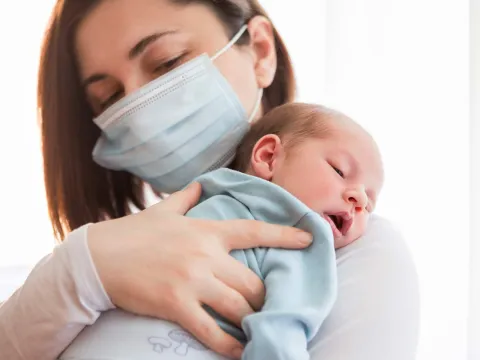- AdventHealth

Of course, becoming a new parent comes with excitement, joy, worry and maybe a bit of fear. But to those new mothers who are welcoming their little one into the world during a pandemic, you may be facing different types of worry or uncertainty, particularly surrounding how to breastfeed your baby if you’ve tested positive for COVID-19 or are awaiting test results.
According to the American Academy of Pediatrics (AAP), breastfeeding can satisfy all your infant’s nutritional needs for the first six months of life. But it’s about more than just feeding — it also creates quality bonding time with your child that comforts them and nurtures feelings of safety, security and love.
COVID-19 and Breastfeeding
With the data and research available to us now, we know that breastmilk is considered to be an unlikely source or coronavirus transmitter. The Centers for Disease Control and Prevention (CDC) strongly support breastfeeding as the best choice for infant feeding. Breastmilk protects your baby against many illnesses, supports a strong immune system and provides ideal nutrition.
Nursing and Pumping Recommendations
If you have tested positive for COVID-19 or are awaiting your results, you, along with your family and healthcare providers, should decide whether and how to breastfeed. If you decide breastfeeding is the right option, here are some guidelines to do so safely, recommended by the CDC and AdventHealth for Women International Board-Certified Lactation Consultant, Stacie Gehring:
- Before touching your baby, wash your hands with soap and water for at least 20 seconds
- Wear a mask while breastfeeding and any time that you are less than 6 feet from your baby
- If separated from your baby or if you don’t feel well enough to breastfeed, begin using a breast pump
- Wear a mask while pumping and wash your hands before touching pump parts or bottles
- Pump both breasts for 15–20 minutes at least every three hours for a total of eight times per day
- Save any breastmilk that you are able to collect so it can be given to your baby by a healthy caregiver
- Follow recommended steps for proper pump cleaning, washing your pump parts with soap and water after each use and sanitizing them once per day
If your baby is in the neonatal intensive care unit (NICU) and you have been discharged from the hospital, continue to pump at home and store your milk in the refrigerator or freezer (refer to NICU storage guidelines) until it can be brought into the hospital by a healthy caregiver.
Breastfeeding Support
The Breastfeeding Center at AdventHealth for Women is available to new moms and is staffed by our certified lactation consultants. To discuss breastfeeding issues, please call 407-303-7650 to speak with one of our consultants or visit us online for additional support.
Further information on breastfeeding with COVID-19 can be found from the CDC and AAP.



